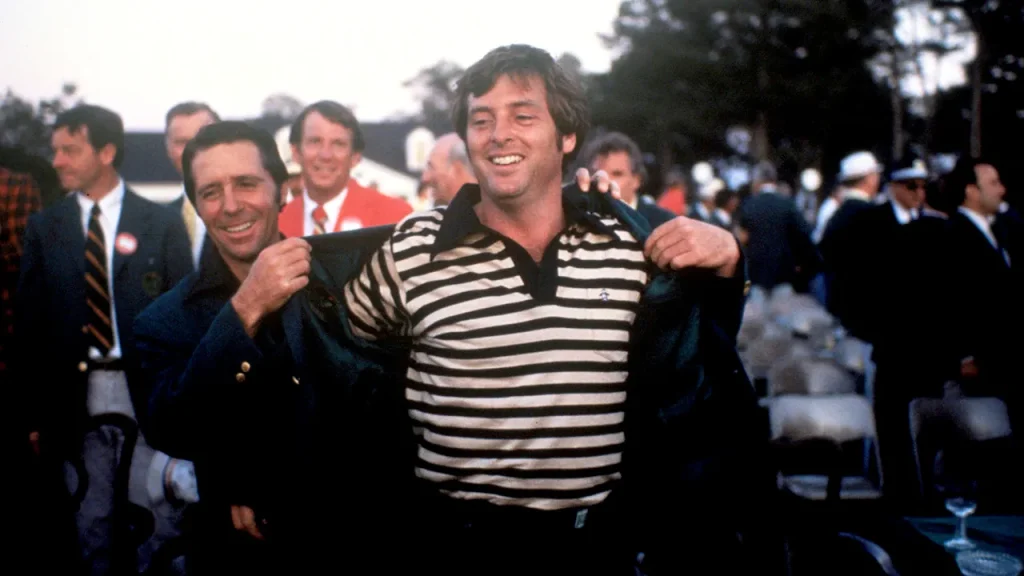Remembering Golf Legend Fuzzy Zoeller: A Charismatic Champion Who Left His Mark on the Game
The golf world mourns the loss of Fuzzy Zoeller, who passed away at 74, as announced by the PGA Tour on Thursday. Commissioner Jay Monahan captured the essence of the two-time major champion in his tribute: “Fuzzy was a true original whose talent and charisma left an indelible mark on the game of golf. Fuzzy combined competitive excellence with a sense of humor that endeared him to fans and fellow players alike.” These words encapsulate what made Zoeller special—not just his skill with a club, but his ability to connect with people through his personality, creating a legacy that extends beyond his impressive list of victories on the course. His passing leaves a void in the golf community, which now celebrates his remarkable contributions while extending condolences to those who knew him best.
Zoeller’s career highlights include 10 PGA Tour victories, but it was his major championship wins that cemented his place in golf history. His journey to greatness began with a stunning accomplishment—winning the 1979 Masters on his very first attempt at Augusta National, a feat that has rarely been matched in the tournament’s storied history. This victory, only his second on the PGA Tour, immediately established him as a force to be reckoned with in professional golf. Five years later, Zoeller added to his legacy with an emphatic win at the 1984 U.S. Open at Winged Foot Golf Club. In an 18-hole playoff against Greg Norman, Zoeller delivered a masterclass performance, shooting a three-under 67 while Norman finished eight strokes behind. This dominant display showcased Zoeller’s ability to perform at the highest level when the pressure was most intense, demonstrating both his technical skill and mental fortitude on one of golf’s biggest stages.
Though his major championship victories stand as the pillars of his career, Zoeller’s competitive spirit shone through in other significant tournaments as well. He came tantalizingly close to adding a third major title at the 1981 PGA Championship, where he finished second. Later in his career, Zoeller demonstrated his longevity at the elite level when he finished third in the 1994 Open Championship at Turnberry. That tournament showed Zoeller’s continued excellence, as he shared the lead heading into the final round before Nick Price’s 4-under final round secured the victory. Zoeller’s consistent performance at major championships throughout his career—including another top-10 finish at the Masters and his Senior PGA Championship victory in 2002—illustrated his ability to compete at the highest level across different courses and against different generations of golfers. These near-misses and victories alike contribute to a career that was defined by competitive excellence and remarkable consistency.
Beyond his individual accomplishments, Zoeller proudly represented the United States in three Ryder Cup competitions in 1979, 1983, and 1985. These team events showcased another dimension of his golfing career—his ability to perform both as an individual and as part of a collective effort representing his country. His first two Ryder Cup appearances resulted in American victories, continuing a long tradition of U.S. dominance in the competition. However, his final appearance in 1985 marked a historic shift in the competition’s landscape, as the European team, now bolstered by legendary players like Seve Ballesteros, Bernhard Langer, and Sandy Lyle, defeated the Americans for the first time since 1957. This changing of the guard in the Ryder Cup coincided with Zoeller’s career reaching its later stages, placing him at an interesting intersection of golf history as the competition evolved into the intense, closely contested spectacle it remains today.
What made Zoeller truly special, however, went beyond his tournament victories and statistical achievements. He was known throughout the golf world for his charisma, wit, and approachable demeanor—qualities that made him a fan favorite wherever he played. In an era when many golfers maintained a more reserved public persona, Zoeller’s personality shone brightly, bringing a refreshing energy to the sport. He approached the game with a rare combination of serious competitive drive and lighthearted enjoyment that resonated with spectators and fellow players alike. This balance—being able to compete fiercely while never losing sight of golf’s inherent pleasures—made him relatable to everyday golfers who saw in Zoeller someone who understood that golf, even at its highest levels, remains a game to be enjoyed. His authentic approach to both life and sport created connections with fans that transcended his playing statistics, fostering a legion of admirers who appreciated him as much for who he was as for what he accomplished.
Fuzzy Zoeller’s passing marks the end of a life that enriched the game of golf in multifaceted ways. From his stunning debut Masters victory to his commanding performance at Winged Foot, from his Ryder Cup appearances to his later career on the Senior Tour, Zoeller crafted a career that exemplified excellence at every turn. Yet perhaps his most enduring contribution was how he played the game—with a smile, a joke, and a genuine appreciation for the opportunity to compete at the highest level. As the golf world reflects on his life and career, the memories that emerge most vividly capture not just his winning moments but the spirit with which he approached each round. In Commissioner Monahan’s words, we celebrate his “remarkable legacy”—one that reminds us that in golf, as in life, how we play the game matters just as much as the score we record. Fuzzy Zoeller understood this profound truth, and in doing so, he left the game richer than he found it.


